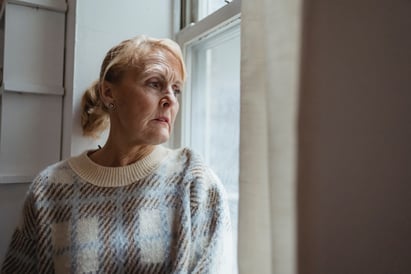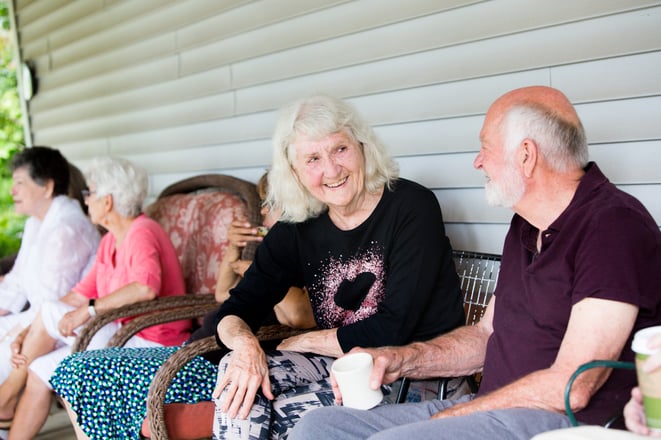Covid-19 altered life as we knew it in unprecedented ways and challenged us to adapt more quickly than we dreamed possible.
Little more than three years since the onset of the pandemic, we are beginning to shake off the dust and see the profound and lasting effects of the virus that changed the world.
One result that has come into laser focus is the undeniable negative impact of social isolation on overall health and well-being.
Indeed, insufficient socialization is a triple threat, taking a physical, mental and cognitive toll on those who experience it, particularly seniors who are more apt to live alone, have limited mobility and lose spouses or friends.
Loneliness By the Numbers
 Recent findings from the University of Michigan National Poll on Healthy Aging show that a lack of companionship among older adults has decreased since the pandemic, which is reason for hope, but there is still great cause for concern.
Recent findings from the University of Michigan National Poll on Healthy Aging show that a lack of companionship among older adults has decreased since the pandemic, which is reason for hope, but there is still great cause for concern.
The poll showed that feelings of isolation in seniors were at a peak in June 2020 (at 41%), a low in 2018 before the pandemic (34%), and mid-range currently in 2023 (37%). But “high, middle and low” are relative terms, as these percentages are hardly insignificant and social isolation is still an urgent issue for older adults, according to the AARP Foundation.
Noted the University of Michigan poll’s senior advisor, “The pandemic has shown us just how important social interaction is for overall mental and physical health and how much more attention we need to pay to this from a clinical, policy and personal perspective.”
Negative Health Effects of Social Isolation
There is reason to sound the alarm loudly on diminished social interactions. Meta analysis of research over the past decade reveals the profound damage isolation and loneliness can inflict:
- 50% increased risk for dementia and Alzheimer’s
- 29% increased risk for coronary heart disease
- 32% greater risk of stroke
- 50% higher mortality rates; in terms of longevity, social isolation is equivalent to smoking 15 cigarettes per day.
- Greater risk of anxiety, major depression and suicide
A Gray Matter of Fact
 What’s more, scientific studies are increasingly linking social connections to brain health. They’re finding that socialization modifies our brain, activating neural circuits and keeping them flexible. There is also evidence that meaningful social interactions strengthen mental resilience and cognitive reserve (the ability to solve problems and cope with challenges) and decrease incidence of dementia and Alzheimer’s.
What’s more, scientific studies are increasingly linking social connections to brain health. They’re finding that socialization modifies our brain, activating neural circuits and keeping them flexible. There is also evidence that meaningful social interactions strengthen mental resilience and cognitive reserve (the ability to solve problems and cope with challenges) and decrease incidence of dementia and Alzheimer’s.
Turning It Around
Addressing the problem of social isolation on a broader scale has become a priority among local and national entities in the wake of the pandemic.
Community organizations, state and local governments, tech companies and other groups have implemented measures to provide socially isolated seniors with a variety of tools and services that will put them in regular contact with others.
A national campaign called Commit to Connect, developed by a branch of the U.S. Department of Health and Human Services in partnership with several other federal agencies, associations and non-profits, is reaching millions of people in isolation.
The Invaluable Value of Senior Living Communities
Post-pandemic, with the spotlight on the need for vital human connections and the desire for them even stronger, occupancies in senior communities are back.
“There was no lasting detriment to the industry; the better communities got on it immediately,” said Margaret Wylde, founder of ProMatura, a market research company serving residential communities.
Remarked one woman who lost her husband and initially considered moving to a condominium before choosing a senior community, “I thought, who am I going to talk to? Who am I going to have dinner with?”.
Those questions are at the root of many older adults’ choice to move from their own residence to a vibrant, socially active senior community. Many do it while they are still living independently, requiring no assistance with activities of daily living so they can take full advantage of everything the community has to offer.
- Friendly Staff
One of the first things residents who move into Collington notice is our warm, hospitable staff. Said Gwen, a new resident in independent living, “The staff at Collington is phenomenal. All are friendly, welcoming and thorough in making sure all is well with me and my new home.” The value of resident-staff relationships is shored up by an AARP survey showing that 40% of adults have a friend at least 15 years younger and that intergenerational bonds are uniquely beneficial to all ages.

- Vital Resident Connections
At Collington, multi-faceted fellow residents become fast friends. There is always someone with whom to share a meal over conversations as fresh and interesting as our chef’s savory creations. Together, residents can explore new interests and hobbies on campus or venture out into the historically rich Washington metro region. Each day is a new opportunity to make the daily human connections we all need to be healthy in mind, body and spirit.
- New Purpose
Today’s best senior communities are designed to foster personal growth, not just fill a day with cookie-cutter activities designed and dictated by someone else. At Collington, residents are self-motivated adults with diverse experiences who want to continue enriching their lives and making a difference in their community. That’s why life at Collington is largely driven by residents themselves. In addition to offering multiple amenities, programs and activities, our staff is excited to celebrate and facilitate our residents’ meaningful ideas and initiatives.
- Continuing Care
The continuum of care at Collington, a Life Plan community providing various levels of care, assures residents that if and when their needs change, they can “age in place” on the Collington campus. They will not have to endure the stress and hassle of moving to another location, and for those couples with differing care needs, they can still be near one another.
“I feel very comfortable knowing I will enjoy and love living in this community,” added Gwen.
Gwen’s assurance is what people contemplating a move to a quality senior community can expect – now more than ever in this time of unparalleled need for essential social interactions.





